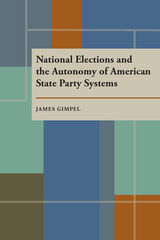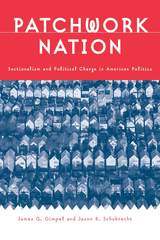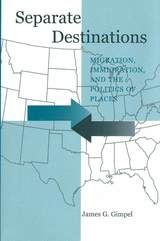3 books by Gimpel, James G.

National Elections and the Autonomy of American State Party Systems
James G. Gimpel
University of Pittsburgh Press, 1996
Traditional theories of party organization have emphasized two-party electoral competition as the force behind party unity in state politics. V. O. Key first advanced this theory in Southern Politics, where he concluded that party factionalism in the South was mainly attributable to the one-party character of the region. But this traditional theory does not fit all states equally well. In the states of the West, especially, parties are competitive, but political activity is centered on candidates, not parties.
The theory of candidate-centered politics allows Gimpel to explain why party factionalism has persisted in many regions of the United States in spite of fierce two-party competition. Using interviews, polling data, elections returns, and demographic information, Gimpel contends that major upheavals in the two-party balance of presidential voting may leave lower offices untouched.
[more]

Patchwork Nation
Sectionalism and Political Change in American Politics
James G. Gimpel and Jason E. Schuknecht
University of Michigan Press, 2004
Though local and regional politics are often ignored in political-behavior literature, analyses of these areas are fundamental to understanding the scope of political change in the regimes experiencing realignment and for which there are no survey data. With the unprecedented population movement and socioeconomic mobility of the twentieth century, political support has been reshuffled in many parts of the country. Yet at the dawn of the new century, these local and regional movements are rather poorly understood. Patchwork Nation examines the forces that account for pervasive political regionalism and the geographic shifts that continue to alter the nation's political landscape.
The authors focus on twelve states in particular, identifying regional differences in support for candidates or political parties and find that the electoral foundations for political regionalism differ from state to state. Thus, regionalism within states is not easily reducible to one or two population characteristics that are common to all states. The authors demonstrate the importance of a political geographic approach to American political behavior and challenge the tendency in the scholarly literature to ignore the impact and significance of local contexts.
James G. Gimpel is Professor of Government and Politics, University of Maryland, College Park.
Jason E. Schuknecht is a Research Analyst at Westat, Inc. in Rockville, Maryland.
[more]

Separate Destinations
Migration, Immigration, and the Politics of Places
James G. Gimpel
University of Michigan Press, 1999
Natives who change residence do not settle in the same places as immigrants. Separate Destinations argues that these distinct mobility patterns, coupled with record levels of immigration from impoverished third world nations, are balkanizing the American electorate. James G. Gimpel examines the consequences of different patterns of movement and settlement on the politics of the communities in which these different groups settle.
Newer immigrants are con-strained by a lack of education, money, English literacy, and information--and frequently by discrimination--to live in areas of coethnic settlement. Domestic, native-born migrants--predominantly Caucasian--free of discrimination and possessing more money and information, move where they wish, often to communities where immigrants are not welcome or cannot afford to live. Strong evidence suggests that spatially isolated immigrants are slower to naturalize and get involved in politics than domestic migrants.
Gimpel looks closely at states with very different patterns of migration and immigration: California, Colorado, Kansas, Kentucky, Florida, Pennsylvania, and New York. In these states, Gimpel shows the impact of population mobility on party registration, party votes, and voter turnout and asks whether population changes have changed the dominant party in a state or produced a political reaction from natives.
Separate Destinations contains a number of thematic maps detailing the settlement patterns of internal migrants and immigrants for both counties and census tracts. Blending insights from a number of social science disciplines, including economics, demography, sociology, political science, and anthropology, this book will be of interest to a wide and diverse readership of scholars, students, and policymakers.
James G. Gimpel is Associate Professor of Government, University of Maryland.
[more]
READERS
Browse our collection.
PUBLISHERS
See BiblioVault's publisher services.
STUDENT SERVICES
Files for college accessibility offices.
UChicago Accessibility Resources
home | accessibility | search | about | contact us
BiblioVault ® 2001 - 2024
The University of Chicago Press









